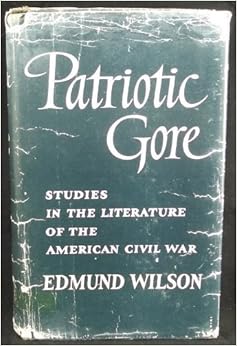Edmund Wilson was a significant literary and social critic in his lifetime -- not to mention a passionate, rejected, suitor of Edna St. Vincent Millay -- but more lately his work has gone into eclipse. As an intellectual who was based (1895 - 1972) in the rise and full flowering of the Modern, his thinking was deeply informed by Marx and Freud, who have also been in eclipse for some decades. Perhaps more to the point right now, in this zenith era of nerd culture, Wilson is most famous for characterizing J.R.R. Tolkien as "juvenile trash" and H.P. Lovecraft as "hackwork."
Despite committing lèse-majesté upon genre fiction, Wilson did have a keen mind for the excellent in American letters. Yet, re-reading Patriotic Gore: Studies in the Literature of the American Civil War (1962) for the first time since the early 1980's, it's showing itself to be almost an oddity of writing and of literary criticism, for reasons that did not register with me upon that earlier reading.
This oddness begins with the Introduction, in which he flatly states that slavery was merely a demagogic strategy employed by the
Then there is his discussion of the figures of the era and their output about the war, which seems to be more about him and his thinking than about them and their thinking.
And finally, he doesn't include the two writers who really were in the war in its most terrible phase, Louisa May Alcott and Walt Whitman, who cared for the dead, the dying, the maimed and the wounded who are war's great production. He doesn't include any writer that isn't worth looking at, but that he leaves out these two, seems peculiar.


No comments:
Post a Comment